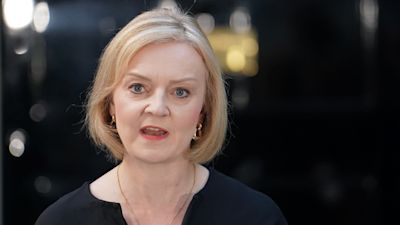Insight
Liz Truss to tell world leaders UK's commitment to Ukraine is 'total' during first overseas trip

Liz Truss has said that Russia must recompense for what has happened in Ukraine and never again be able to threaten a neighbour in her first trip abroad as prime minister.
Speaking to reporters on her way to the United Nations (UN) general assembly in New York, where she wants to seek unity with western allies over remaining firm on Russia, she said: “First Russia needs to leave Ukraine.
"And we need to make sure that there is proper recompense for what has happened in Ukraine, and we need to make sure Russia is never again able to threaten countries on its border.”
Government sources suggested that paying the price for Ukraine could include economic reparations to war crimes tribunals, if evidence was found.
It comes as Truss prepares to deliver a speech in which she will call on other countries to avoid any complacency in defending their values, and stress the need to invest in defence. She pledged to spend 3% of UK GDP on defence.
However, some developing countries are sceptical of the tough Western response to Ukraine, that they feel has caused suffering in terms of food and energy insecurity and higher prices.
ITV News Deputy Political Editor Anushka Asthana reports on Liz Truss' first overseas trip as prime minister to New York.
However Truss argued that energy security was “priceless”.
The PM is expected to say: “This is a decisive moment in British history, in the history of this organisation, and in the history of freedom.
“The story of 2022 could have been that of an authoritarian state rolling its tanks over the border of a peaceful neighbour and subjugating its people.
“Instead, it is the story of freedom fighting back… But this must not be a one off.
"Britain’s commitment to this is total.
“Together with our friends and allies around the world, we will continue to champion freedom, sovereign and democracy.
“And we will define this new era as one of hope and progress.”
It came as she also insisted that she wanted a negotiated deal on the Northern Ireland protocol in a more conciliatory tone.
But speaking before a bilateral meeting with France President Emmanuel Macron she insisted that she would not "allow the situation to drift".